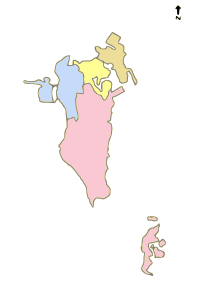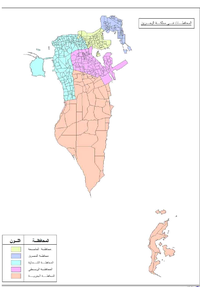
Manama is the capital and largest city of Bahrain, with an approximate population of 200,000 people as of 2020. Long an important trading center in the Persian Gulf, Manama is home to a very diverse population. After periods of Portuguese and Persian control and invasions from the ruling dynasties of Saudi Arabia and Oman, Bahrain established itself as an independent nation in 1971 after a period of British hegemony.

Politics of Bahrain has since 2002 taken place in a framework of a constitutional monarchy where the government is appointed by the King of Bahrain, King Hamad bin Isa Al Khalifa. The head of the government since 2020 is Crown Prince Salman bin Hamad Al Khalifa, who became Prime Minister following the death of Khalifa bin Salman Al Khalifa, and who also serves as Deputy Commander of the Bahrain Defence Force. The parliament is a bi-cameral legislature, with the Council of Representatives elected by universal suffrage, and the Consultative Council appointed directly by the king.

Khalifa bin Salman Al Khalifa was a Bahraini royal and politician who served as the Prime Minister of Bahrain from 10 January 1970 until his death in 2020. He took office over a year before Bahrain's independence on 15 August 1971. He was the longest-serving prime minister in the world. Under the 2002 Constitution he lost some of his powers, with the King now having the authority to appoint and dismiss ministers.

Muharraq is Bahrain's third largest city and served as its capital until 1932 when it was replaced by Manama. The population of Muharraq in 2020 was 263,373.

Bahrain has had two constitutions in its modern history. The first one was promulgated in 1973, and the second one in 2002.
Sheikh Mohammed Khalid Ibrahim is a Bahraini Islamist politician and a member of the Al-Menbar Islamic Society in Bahrain. He was an MP in the lower house of the Bahraini parliament, having been elected in the 2002 Bahrain parliamentary elections representing a constituency from the Northern Governorate. Khalid is a known outspoken critic of the Bahraini government over conservative issues such as the selling of alcohol.
The Bahraini Premier League is the main football competition in the Kingdom of Bahrain. Currently known as the Nasser bin Hamad Premier League, the first season was held in 1957. The winners of the domestic championship qualify for the AFC Cup. The championship is currently contested by 12 clubs.

Women candidates of the 2006 Bahrain election, which took place on the November 25, 2006 were reported to have received numerous threats from Islamic salafist and other factions to prevent them taking part. In all, eighteen female candidates of various political stances and views took part after recent changes to the political system in 2001 allowed women to not only become candidates, but also gave them the right to vote.

The cinema of Bahrain is small as its lacks support from the government and the private sector. There are many short films produced by individual filmmakers, and about five feature films in Bahrain's history.
Halat Nuaim-Seltah is a Bahraini island. It is located off the coast of Muharraq island, near the town of Hidd. It lies 5 km (3.1 mi) east of the capital, Manama, on Bahrain Island.

The following outline is provided as an overview of and topical guide to Bahrain:

Bahrain, officially the Kingdom of Bahrain, is an island country in West Asia. It is situated on the Persian Gulf, and comprises a small archipelago made up of 50 natural islands and an additional 33 artificial islands, centered on Bahrain Island which makes up around 83 per cent of the country's landmass. Bahrain is situated between Qatar and the northeastern coast of Saudi Arabia, to which it is connected by the King Fahd Causeway. The current population of Bahrain is 1,870,817 as of May 14, 2023, based on elaborations of the latest United Nations data, of whom 712,362 are Bahraini nationals. Bahrain spans some 760 square kilometres (290 sq mi), and is the third-smallest nation in Asia after the Maldives and Singapore. The capital and largest city is Manama.
Mohammed Hasan Kamaluddin is a Bahraini former cabinet minister, member of parliament, ex-diplomat, poet, historian, writer and researcher. He is best known for having published the first Encyclopedia of Bahraini History, stretching from 3000 B.C. to the modern Bahraini state. It is the largest and first work of its kind in the GCC region.

The Ministry of the Interior is responsible for law enforcement and public safety in Bahrain. The headquarters of the ministry is the Diwan Fort in Manama, colloquially referred to as "al-gal'aa".
The Public Security Forces (PSF), formerly known as the Bahrain State Police, are the principal Bahraini law enforcement arm of the Ministry of Interior. They are commanded by Maj. Gen. Tarek Al Hasan and include all Ministry of Interior field units responsible for maintaining order and security in Bahrain.
The following is an incomplete timeline of events that followed the Bahraini uprising of 2011 from July to December 2011. This phase saw many popular protests, escalation in violence and the establishment of an independent government commission to look into the previous events.

Abdullatif bin Rashid Al Zayani is a Bahraini engineer and retired lieutenant general. He is the foreign minister, having formerly been the secretary general of the Gulf Cooperation Council (GCC) from 1 April 2011 to February 2020. He was the fifth GCC secretary general and the first with military background since the GCC was established.

The History of Bahrain (1783–1971) covers the history of Bahrain since the invasion of Al Khalifa until the independence from the British Empire.

General elections were held in Bahrain in November and December 2018 to elect the 40 members of the Council of Representatives. The first round of voting was on Saturday, 24 November, with a second round in 31 constituencies on Saturday, 1 December. A municipal poll coincided with the parliamentary vote.
Ahmed Ibrahim Rashid Al Mulla is a Bahraini soldier, lawyer, and politician. He served as the Speaker of the Council of Representatives from 2014 to 2018.











